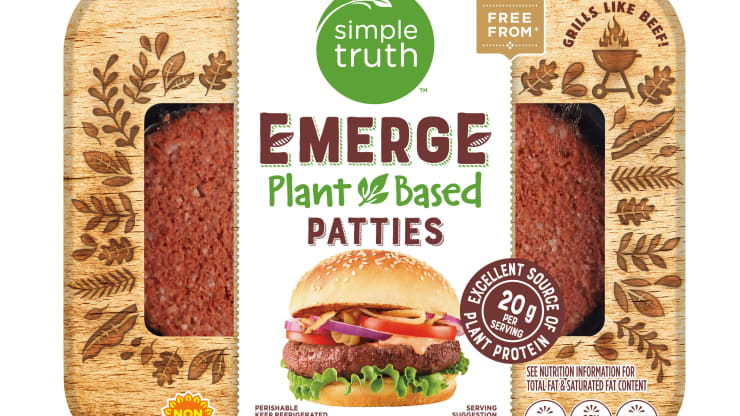In just a few short years, plant-based brands like Beyond Meat, Impossible Foods, JUST Egg, Oatly and others have grown from specialty items consumers had to hunt for to hot grocery trends that are must haves at supermarket chains around the country.
But increasingly, those name brands aren’t the only options for grocery shoppers seeking more plant-based alternatives to traditional meat, eggs and dairy products. According to the Good Food Institute’s Good Food Retail Report, private-label plant-based products are also a growth area for grocers.
“In the more developed plant-based categories, such as meat, milk, and ice cream, if ‘private-label’ were a brand, it would already rank among the top 10 by dollar sales,” the report says.
GFI’s report ranks the top 15 US grocery retailers based on their plant-based offering. For the purposes of the report, plant-based foods included products designed to be direct replacements for traditional meat, dairy and egg products, and didn’t include naturally vegan items like fresh produce, beans and grains.
Whole Foods Market ranked first for its overall selection of plant-based products, while Kroger-owned King Soopers ranked first for its selection of plant-based private-label products, with 38 different items. The other retailers on the list offer 15 private-label items on average, the report found, and Whole Foods and Wegmans were also recognized for their growing rosters of private-label selections.
Plant-based milk was the only category in which every grocery chain evaluated in the report had at least one private-label product, GFI Corporate Engagement Strategist Emma Ignaszewski said in a May interview.
Private-label has gone from no-frills low-priced products to store brands that rise to the same quality levels as national brands, and consumers’ trust in their supermarkets is fueling growth in the category, but price is still a factor in buying decisions.
Creating new private-label brands gives consumers more choices at a range of price points, and could ultimately help drive down the cost of plant-based foods, Ignaszewski said.
Developing new private-label options is one part of the report’s three-pronged strategy for growing plant-based sales, along with stocking a variety of brands across the different product categories and serving plant-based alternatives in the prepared food section.
“Retailers who don’t have at least one private-label plant-based meat product on shelf should consider developing one,” the GFI report says. “Retailers with existing plant-based meat lines should continue to take advantage of the rising popularity of plant-based beef, chicken, pork, and more by expanding their lines to include a variety of product types and formats.”
Grocers can also look to industry segments with potential for growth including plant-based meals and non-dairy alternatives to cheese, yogurt and butter.
Private label in general
Overall sales of private-label consumables in mass retail channels grew 41% by dollar value between 2013 and 2018, according to Nielsen data and, while name brands still comprised the biggest chunk of total sales, that category grew just 7.4% in the same period. Sales by unit of private-label foods grew by 33.2% compared to 1% growth in name brands.
More than 99% of US consumers buy at least some private-label products, according to an IRI survey released last year. Consumers often opt for store brands from their trusted supermarkets as the array of options grows, a trend that has retailers expanding their private-label offerings to meet demand.
Millennials are a key demographic when it comes to buying store brands, and the group’s adoption of private-label brands grew 10% from 2018 to last year, according to IRI.
Younger consumers are also key when it comes to buying plant-based foods, according to the GFI report. Forty-two percent of millennials and 46% of Gen Z consumers have adopted flexitarian diets, meaning they’re opting for more meatless meals and plant-based products, without going fully vegetarian or vegan.
Developing new private-label options
Early this year, Kroger announced the national rollout of its Simple Truth Emerge line of plant-based burgers and beef-like crumbles. The line expands on the Simple Truth Plant Based line launched in 2019 that features vegan items including chocolate chip cookie dough, oat milk and deli slices.
The Emerge products are made with pea protein, merchandised in the meat case and priced lower than name brands, the retailer said in January.
Some suppliers are also catching onto the growing demand for private-label products in the plant-based space.
In April, meat maker Cargill announced plans to create plant-based patties and ground meat alternatives that retailers will be able to use to create their own private-label lines. Smaller players like Improved Nature and Better Meat are also making plant-based proteins that companies can use to create new private-label lines.
“By strengthening product assortments and developing compelling private-label lines, retailers can take advantage of the rapid democratization of plant-based foods and ensure that they have products positioned for every consumer segment,” the GFI report says.
Related stories:
- Report: Last year played a pivotal role in growing plant-based food sales
- How plant-based food makers have adjusted to the pandemic
- Why food brands should continue to work with influencers during the pandemic
If you enjoyed this article, you can sign up for Consumer Brands SmartBrief to get news like this in your inbox. For even more great news content, sign up for any of SmartBrief’s 275+ free email newsletters today, free.
